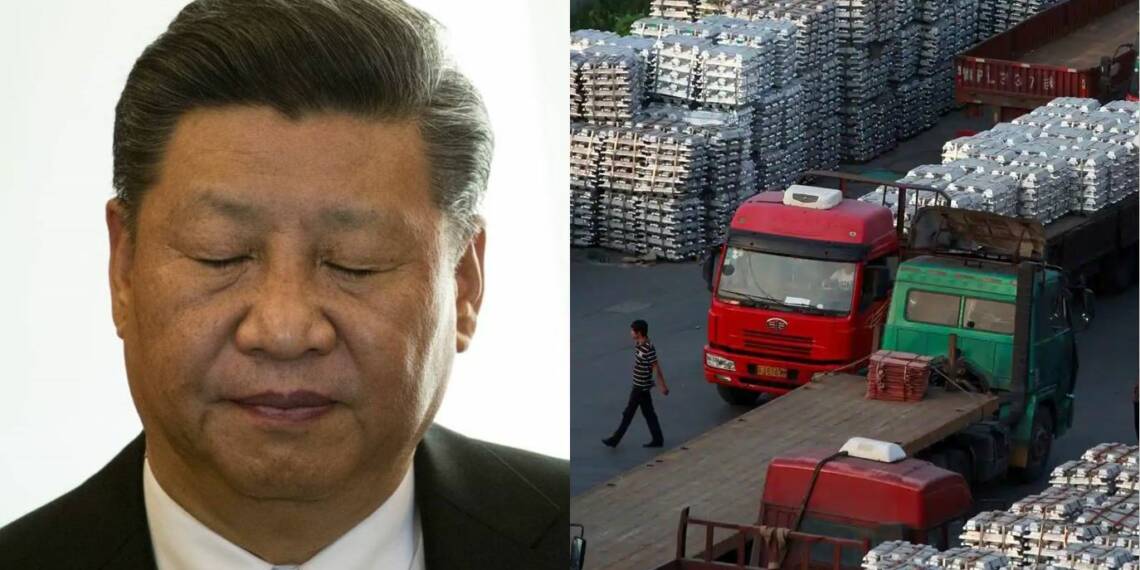On Wednesday, China announced plans to release industrial metals from its national reserves in order to lower commodity prices, in what some analysts believe will be the first such step by the world’s largest metal consumer in a decade.
Since the pandemic subdued, the global media has reported an upswing in the Chinese economy, but with that, the commodity prices have also risen to never-seen-before levels. Overall commodity prices are shooting up because of the turbulence brewing within the Chinese economy. Chinese President Xi Jinping’s short-sightedness is the main reason to be blamed. His unilateral trade sanctions against Australia massively backfired as Chinese cities went dark without Australian coal. Moreover, in his attempt to punish Jack Ma, major Chinese businesses have lost faith in the CCP to aid them in times of need. Besides, Jinping’s propensity to interfere and force the market to his will is another sticking point that is creating a toxic concoction of anti-market forces which will eventually implode the Chinese economy.
The National Food and Strategic Reserves Administration announced on its website that copper, aluminium, and zinc would be released in batches to nonferrous processing and manufacturing enterprises via public auction “in the near future.” The announcement comes as Beijing tries to contain a rise in metal prices this year fuelled by a post-pandemic economic recovery, abundant global liquidity, and speculative buying that has eroded manufacturers’ margins.
Due to rising commodity costs, factory gate prices in China surged at their quickest annual rate in over 12 years in May, eroding enterprises’ profit margins and reflecting global price pressures. Citi said in a report on Monday that the move could be part of “efforts to crack down on commodity price hikes by managing market expectations and deterring speculators, more than resolving any material physical shortages.” as suspicion swirled about it before it was verified by the government.
According to Citi, China’s previous strategic stock release, which did not include copper, occurred in November 2010. Antaike, a government research institute, drew parallels between the announcement and the release in 2010. In the Asian afternoon session on Wednesday, most base metals were trading substantially down.
In May, benchmark London copper touched a new high of $10,747.50 per tonne, up more than 60% since March last year, when the coronavirus wiped out demand. In May, Shanghai aluminium reached its highest level since 2010, while zinc reached its highest level since 2007. “The Chinese authorities are trying to help support the margins at (their) manufacturing industry as they have found it hard to transfer these costs to the end-users,” said commodities broker Anna Stablum at Marex Spectron.
The administration’s statement provided no information on the amount of metal to be auctioned, the auction process, or which manufacturers will be authorised to bid. Based on past purchase and sales records, Citi estimates China’s state reserves for copper, aluminium, and zinc to be 2 million tonnes, 800,000 tonnes, and 350,000 tonnes, respectively. “Our base case is for total volumes of … aluminium and zinc selling to be around 2% of China’s annual demand, i.e., around 770,000 tonnes of aluminium and 140,000 tonnes of zinc, and for copper volumes to be minimal,” it added.
Metals markets, according to analysts and dealers, have already priced in some sales from China’s reserves. “However, we still don’t have any information about the size of these sales, and it will definitely continue to weigh on these markets,” Stablum added.
But the major issue that stems from tapping into its own reserves is that China has been dependent on natural resource imports for a long time, and thus does not has a proper industrial setup to tap its own natural resources.
Jinping’s misadventures with Australia, the Chinese market and clamping down on Chinese business tycoons have pushed the Chinese economy into a turbulent phase. The decision to tap into its own reserves suddenly showcases the lack of foresight on Jinping’s part. China has lost faith of the world and the exports are falling and Jinping and the Chinese economy is on the cusp of disaster.








